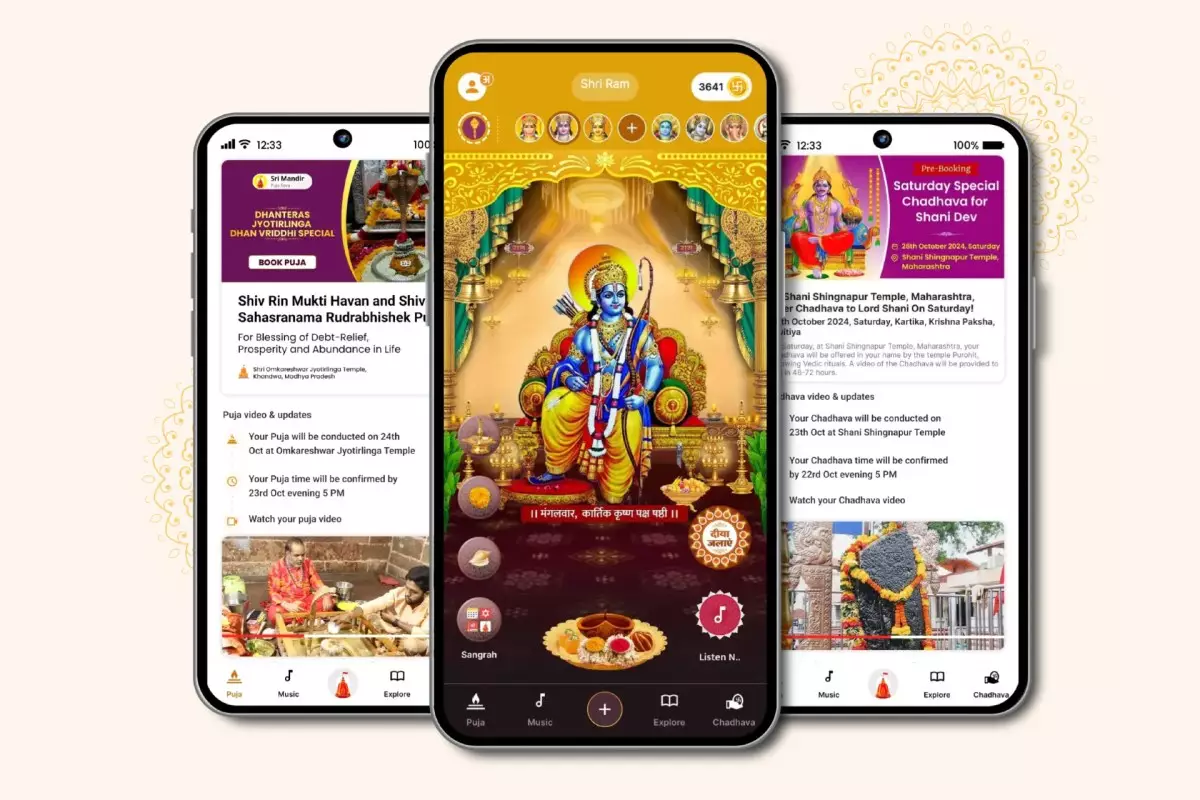India, a country where faith intertwines with daily life, boasts an astonishing number of temples—53 for every 100,000 individuals. The Hindu temple economy itself is a colossal sector, valued at approximately ₹3.02 trillion (around $40 billion), contributing nearly 2.3% of the nation’s GDP. Yet, despite the sector’s vastness, many facets of religious devotion remain entrenched in offline, fragmented practices. Rituals, offerings, and prayers largely occur in person, presenting a maze of logistical and accessibility challenges, especially for devotees residing in smaller towns or abroad.
Into this age-old ecosystem steps AppsForBharat, an ambitious Indian startup shaking up spiritual engagement through its flagship app, Sri Mandir. Founded in late 2020, Sri Mandir has rapidly emerged as a digital hub, allowing devotees to perform prayers and make offerings online, connecting them virtually to over 70 temples across India. Rather than merely digitizing rituals, AppsForBharat is redefining how religion interfaces with modern technology, fostering a deeply personalized and accessible devotional experience.
A Surge in Digital Devotion: User Growth and Behavioral Insights
Sri Mandir’s growth trajectory is nothing short of remarkable—boasting over 40 million downloads and currently sustaining 3.5 million monthly active users. Notably, this user base isn’t confined to India; roughly 700,000 registered users reside overseas, largely within the U.S., U.K., UAE, Canada, Australia, and New Zealand. This diaspora-driven traction is crucial, with the average revenue per user (ARPU) abroad significantly surpassing domestic figures—about ₹7,000 versus ₹600-800 in India.
This disparity underscores more than revenue metrics; it reflects how physical distance from temples intensifies the need for digital platforms to maintain religious connections. Interestingly, Sri Mandir sees higher engagement overlap abroad, with around 50% of users performing both prayers and offerings online. In contrast, only 20-25% of Indian users engage in both activities, likely due to more accessible offline alternatives.
Within India, the app evenly spans tier-1 and tier-2 cities, with a healthy demographic mix—30% under the age of 35—highlighting a young audience embracing digital spirituality. The retention statistics further testify to deep-rooted user trust: approximately 55% of users remain active six months post-download, a rarity in app ecosystems driven by single-use interactions.
Strategic Funding and Market Positioning Amidst Rising Competition
AppsForBharat’s fundraising success mirrors investor confidence in religious tech’s untapped potential. After raising $18 million just nine months prior, the startup secured an additional $20 million in its Series C round, led by Susquehanna Asia Venture Capital alongside heavyweights like Nandan Nilekani’s Fundamentum Partnership. This influx of capital builds on a cumulative $33.4 million raised earlier, underscoring robust financial backing.
However, the Hindu devotional app market is becoming increasingly crowded. While Sri Mandir dominates the Hindu segment, it now trails LifeChurch.tv’s Bible app within India, which commands over 80 million average monthly active users globally. Competitors targeting the Hindu devout audience exist but occupy a substantially smaller cumulative market share—merely 15-20% of Sri Mandir’s install base—indicating Sri Mandir’s current leadership yet impending pressure to retain its edge.
Despite competition, Sri Mandir deftly monetizes its platform by charging temples a 20-25% commission on services, while expanding revenue streams through temple merchandise sales. Importantly, the app demonstrably enhances temple incomes by 15-25% by attracting and retaining online devotees. This symbiotic growth model is pivotal for maintaining strong temple partnerships and fostering a sustainable business.
Innovative Expansion Plans and AI Integration
The fresh capital injection will fuel aggressive expansion plans concentrated on major temple towns like Varanasi, Ayodhya, Haridwar, and Ujjain. Unique to this phase is the establishment of physical logistics hubs in these locations to manage the delivery of ritual items such as prasad—a critical step blending digital orders with tangible religious experiences. Each facility will process tens of thousands of orders monthly, simultaneously driving local employment—a compelling social impact narrative.
On the tech front, AppsForBharat is pioneering AI-driven features aimed at enriching user engagement. The forthcoming “Ask a Priest” functionality will allow devotees to query matters of faith, prayers, and festivals, replicating traditional human guidance digitally. Skepticism about AI “hallucination” is being proactively addressed by involving subject-matter experts and embedding safeguards to ensure doctrinal accuracy—a crucial consideration in religious contexts.
Religious Tech: A Growing Sector Poised for Transformation
Globally, the religious app market is witnessing a shift. While top religious apps outside India show a modest 15% growth in monthly active users, India’s sector is booming with a 60% increase, spotlighting the country’s unique appetite and readiness for digital faith services. India has also emerged as the world’s second-largest market for religious tech funding, trailing only the U.S., and accounting for 15% of global investments since 2020.
In this fertile environment, AppsForBharat stands at a pivotal crossroads. The company aims to achieve profitability by 2027-28 and contemplates eventual public listing. Its ability to build on current momentum while innovating meaningful user experiences and deepening temple collaborations will be crucial—both to sustain market leadership and to genuinely transform how millions connect with spirituality in an increasingly digital world.

